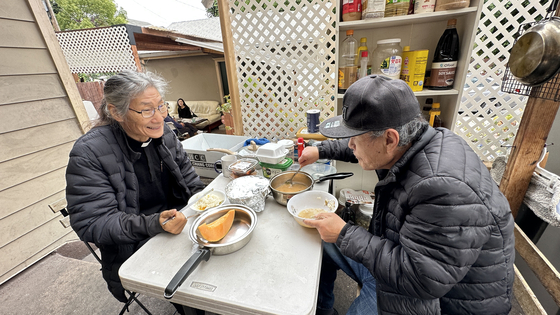
By Suah Jang
The author is a Metro/city news reporter of The Korea Daily.
I was filled with a mix of fear and curiosity as I embarked on a visit to a homeless tent in the heart of Koreatown, Los Angeles, on June 6. From a distance, I had observed these tents scattered along the city streets, but this was my first up-close encounter.
Homelessness stands as one of the most pressing issues plaguing Los Angeles. As a reporter, I’ve delved into countless stories surrounding homeless policies, incidents, and accidents. However, I quickly discovered that experiencing it firsthand was far from the simple task I had envisioned.
Anticipating a tense encounter with the Korean-American homeless community, I braced myself for potential hostility. To my surprise, the meeting unfolded with unexpected ease. These individuals, having found solace in sharing their tumultuous life stories, extended a warmer welcome to the reporter than I had ever imagined.
In witnessing their lives up close and personal, I discovered stark differences from my superficial preconceptions. One would expect a place deemed the lowest rung of society to be saturated with despair, yet amidst the hardship, flickers of hope emerged. With nothing left to lose, they clung to the belief that redemption was within their reach.
Just as bright colors leap off a black canvas, so did hope emanate from within. Despite their dire circumstances, these individuals eagerly awaited a helping hand, fervently believing that their time to rise again was imminent.

Less than 1% of the homeless population in Los Angeles County identifies as Asian, making support services such as housing and job placement alarmingly scarce for Korean-American individuals. Thankfully, Korean-American service organizations and churches strive to bridge this gap through dedicated outreach programs.
Unfortunately, most residents view the homeless as nothing more than an inconvenience. They complain about the unsightliness they bring to neighborhoods and the unsanitary environments they create but seldom consider reaching out to lend a hand. It is far easier to point fingers and demand correction than it is to delve into the complexities of their lives.
“When people spot a homeless individual in their neighborhood, they promptly call for assistance, urging us to take them away,” shared Father Yohan Kim of St. James Episcopal Church, whom I had the privilege of meeting on June 14. “I ask them to take care of these individuals themselves, and the majority hang up immediately.”
His poignant words pierced me personally. Often, we find ourselves thinking, “Someone will do it” or “Someone should do it,” but we forget to include ourselves in that equation.
It’s the small acts of care and kindness, rather than grand revolutions, that have the power to illuminate the world. In his 2013 commencement address at Syracuse University, acclaimed short story writer George Saunders confessed, “What I regret most in my life are failures of kindness… Since your life is going to be a gradual process of becoming kinder and more loving: Hurry up. Speed it along. Start right now.” It was hailed as the best commencement speech at a U.S. college graduation that year.
This heartwarming speech deserves applause for its commitment to helping the poor and sick, but let us not dismiss it as irrelevant to ourselves. In the meantime, there may be someone out there, desperately awaiting a small act of kindness.
With this newfound awareness, I am preparing to hit the road once more, armed with tokens of goodwill, hoping to bring a small, sweet sliver of hope to their troubled lives.




